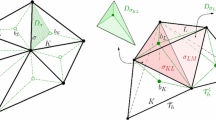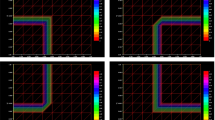Abstract
We present a new stabilized finite volume method for Stokes problem using the lowest order P 1 − P 0 element pair. To offset the lack of the inf -sup condition, a simple jump term of discrete pressure is added to the continuity approximation equation. A discrete inf -sup condition is established for this stabilized scheme. The optimal error estimates are given in the H 1- and L 2-norms for velocity and in the L 2-norm for pressure, respectively.
Similar content being viewed by others
References
Amara, M., Dabaghi, F.: An optimal C 0 finite element algorithm for the 2D biharmonic problem: theoretical analysis and numerical results. Numer. Math. 90, 19–46 (2001)
Barth, T., Bochev, P., Gunzburger, M., Shadid, J.: A taxonomy of consistently stabilized finite element methods for the Stokes problem. SIAM J. Sci. Comput. 25, 1585–1607 (2004)
Becker, R., Braack, M.: A finite element pressure gradient stabilization for the Stokes equations based on local projections. Calcolo 38, 173–199 (2001)
Behr, M., Franca, L.P., Tezduyar, T.: Stabilized finite element methods for the velocity pressure stress formulation of incompressible flows. Comput. Methods Appl. Mech. Engrg. 104, 31–48 (1993)
Blasco, J., Codina, R.: Stabilized finite element method for the transient Navier-Stokes equations based on a pressure gradient projection. Comput. Methods Appl. Mech. Engrg. 182, 277–300 (2000)
Bochev, P.B., Dohrmann, C.R., Gunzburger, M.D.: Stabilization of low-order mixed finite elements for the Stokes equations. SIAM J. Numer. Anal. 44, 82–101 (2006)
Cai, Z.Q.: On the finite volume element method. Numer. Math. 58, 713–735 (1991)
Chen, Z.Y.: L 2 estimate of linear element generalized difference schemes. Acta. Sci. Nat. Univ. Sunyatseni 33, 22–28 (1994)
Chen, Z.Y., Li, R.H., Zhou, A.H.: A note on the optimal L 2-estimate of the finite volume element method. Adv. Comput. Math. 16, 291–303 (2002)
Chen, L.: A new class of high order finite volume element methods for second order elliptic equations. SIAM J. Numer. Anal. 47, 4011–4023 (2010)
Chou, S.H., Li, Q.: Error estimates in L 2, H 1, L ∞ in covolume methods for elliptic and parabolic problem: a unified approach. Math. Comp. 69, 103–120 (2000)
Chou, S.H., Kwak, D.Y.: Analysis and convergence of a MAC scheme for the generalized Stokes problem. Numer. Methods PDEs. 13, 147–162 (1997)
Chou, S.H.: Analysis and convergence of a covolume method for the generalized Stokes problem. Math. Comp. 217, 85–104 (1997)
Chou, S.H., Kwak, D.Y.: A covolume method based on rotated bilinears for the generalized Stokes problem. SIAM J. Numer. Anal. 35, 494–507 (1998)
Codina, R., Blasco, J.: Analysis of a pressure stabilized finite element approximation of the stationary Navier-Stokes equations. Numer. Math. 87, 59–81 (2000)
Crouzeix, M., Raviart, P.A.: Comforming and noncomforming finite element methods for sovling the stationary Stokes equations. RAIRO 3, 33–76 (1973)
Cui, M., Ye, X.: Unified analysis of finite volume methods for the Stokes equations. SIAM J. Numer. Anal. 48, 824–839 (2010)
Dohrmann, C.R., Bochev, P.B.: A stabilized finite element method for the Stokes problem based on polynomial projections, pressure. Int. J. Numer. Methods Fluids 46, 183–201 (2004)
Douglas Jr., J., Wang, J.: An absolutely stabilized finite element method for the Stokes problem. Math. Comp. 52, 495–508 (1989)
Ewing, R.E., Lin, T., Lin, Y.P.: On the accuracy of the finite volume element method based on piecewise linear polynomials. SIAM J. Numer. Anal. 39, 1865–1888 (2002)
Girault, V., Raviart, P.A.: Finite Element Approximation of the Navier-Stokes Equations. Lecture Notes in Mathematics, Vol. 749. Springer-Verlag, Berlin (1979)
Girault, V., Raviart, P.A.: Finite Element Methods for Navier-Stokes Equations: Theory and Algorithms Springer Series in Computational Mathethmatics, Vol. 5. Springer-Verlag, Berlin (1986)
Hughes, T.J.R., Liu, W., Brooks, A.: Finite element analysis of incompressible viscous flows by the penalty function formulation. J. Comput. Phys. 30, 1–60 (1979)
Hughes, T.J.R., Franca, L.P., Balestra, M.: A new finite element formulation for computational fluid dynamics, V. Circumventing the Babus̆ka-Brezzi condition: a stable Petrov-Galerkin formulation of the Stokes problem accommodating equal-order interpolations. Comput. Methods Appl. Mech. Engrg. 59, 85–99 (1986)
Johnson, C., Pitkäranta, J.: Analysis of some mixed finite element methods related to reduced integration. Math. Comp. 38, 375–400 (1982)
Li, J., He, Y.: A new stabilized finite element method based on two local Gauss integrations for the Stokes equations. J. Comp. Appl. Math. 214, 58–65 (2008)
Li, J., Chen Z.X.: A new stabilized finite volume method for the stationary Stokes equations. Adv. Comput. Math. 30, 141–152 (2008)
Li, R.H., Chen, Z.Y., Wu, W.: Generalized difference methods for differential equations: numerical analysis of finite volume methods. Marcel, New York (2000)
Lv, J.L., Li, Y.H.: L 2 error estimates and superconvergence of the finite volume element methods on quadrilateral meshes. Adv. Comput. Math. 37, 393–416 (2012)
Oden, T.J.: RIP-methods for Stokesian flow In: Finite Elements in Fluids, Vol. 4. John Wiley, New York (1982)
Shen, J.: On error estimates of the penalty method for unsteady Navier-Stokes equations. SIAM J. Numer. Anal. 32, 386–403 (1995)
Xu, J.C., Zou, Q.S.: Analysis of linear and quadratic simplical finite volume methods for elliptic equations. Numer. Math. 111, 469–492 (2009)
Ye, X.: On the relationship between finite volume and finite element methods applied to the Stokes equations. Numer. Methods PDEs. 17, 440–453 (2001)
Ye, X.: A discontinuous finite volume method for the Stokes problems. SIAM J. Numer. Anal. 44, 183–198 (2006)
Zhang, T., Lin, Y.P., Tait, R.J.: On the finite volume element version of Ritz-Volterra projection and applications to related equations. J. Comput. Math. 20, 491–504 (2002)
Zhang, T.: Superconvergence of finite volume element method for elliptic problems. Adv. Comput. Math. 40, 399–413 (2014)
Author information
Authors and Affiliations
Corresponding author
Additional information
Communicated by: Charlie Elliott
This work was supported by the National Natural Science Funds of China, No. 11371081; and the State Key Laboratory of SAPI Fundamental Research Funds, No. 2013ZCX02.
Rights and permissions
About this article
Cite this article
Zhang, T., Tang, L. A stabilized finite volume method for Stokes equations using the lowest order P 1 − P 0 element pair. Adv Comput Math 41, 781–798 (2015). https://doi.org/10.1007/s10444-014-9385-9
Received:
Accepted:
Published:
Issue Date:
DOI: https://doi.org/10.1007/s10444-014-9385-9




